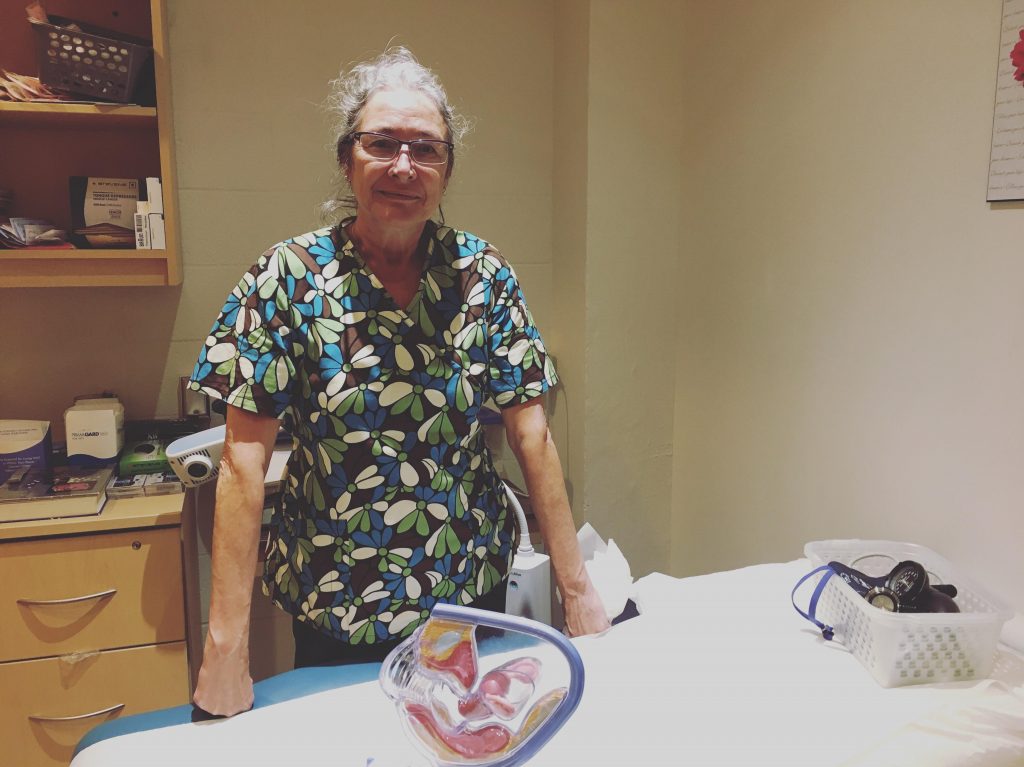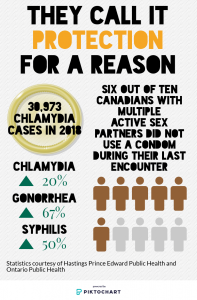
Loyalist College nurse Lauren Deans says if you’re going to have sex you should do it as safely as possible. Photo by Lori-Anne Little, QNet News
By Lori-Anne Little [1]
BELLEVILLE – More people in Hastings and Prince Edward counties were reported with chlamydia last year than with the flu, according to the local health unit.
According to data collected in 2017 and published this year [2] by Hastings Prince Edward Public Health [3], there were 503 probable and confirmed cases of chlamydia, which is sexually transmitted, within the two counties. In contrast, there were only 97 probable and confirmed cases of flu – though officials at the health unit note that many cases of flu are unreported.
In fact, the whole province is facing an increase in sexually transmitted infections, according to a study [4] conducted by Public Health Ontario [5]. Across Ontario between January and August this year, approximately 4,000 cases of chlamydia were diagnosed per month – a total of 30,973 cases in the first eight months of the year. That’s more than the total number of cases diagnosed in all of 2017.
In Hastings and Prince Edward counties we are seeing the same trend, says Stephanie McFaul, the sexual-health program manager at Hastings Prince Edward Public Health.
But what’s caused the increase? That’s a subject of debate.
“It’s hard to know definitively,” McFaul said. “No one can say for sure what is causing the increase. I think there’s a few things that we need to take into account.”
Dr. Chris Mackie [6], medical officer of health at the Middlesex London Health Unit [7], argues that dating sites and apps like Tinder [8] are the cause. He’s taken to Twitter to express that theory.
 Lauren Deans, the nurse at Loyalist College, says she thinks it’s because people are bored and are looking at sex as a way to pass time.
Lauren Deans, the nurse at Loyalist College, says she thinks it’s because people are bored and are looking at sex as a way to pass time.
“A lot of (the Quinte area is) rural, and even Belleville can be fairly rural – like, not a lot of buses come to Loyalist, except for in the past bunch of years. So what do you do when you don’t have any money and you just want to have fun? … Have sex,” said Deans.
It might also be because people aren’t afraid of unprotected sex like they were when the AIDS epidemic hit, she said.
“I don’t know why, but people don’t seem to be afraid. I have no idea – it really blows me away. If I were a guy there is no way that I would have sex without a condom. If I could wear four, I would. How would you like that call? ‘You remember me – we were together last month. Well, I haven’t had my period.’ And then you are a baby daddy. Or you know a girl doesn’t have a condom and they are baby mommies,” she said.
All the health professionals whom QNet spoke to agreed that being educated, getting tested regularly if you are with multiple partners, and always wearing condoms are the best things you can do to combat sexually transmitted infections.
Christine Pfeiffer, a nurse in the sexual-health program at the health unit, says anyone with multiple partners should be getting tested regularly, because STIs don’t always show symptoms. That’s what makes them so hard to keep track of, she said.
“I think there’s a lot of individuals who are not aware of how sexually transmitted infections can be passed from person to person,” Pfeiffer said. “I think there are a lot of people who are not aware that most STIs don’t have symptoms. So they may believe that they or their partners are free from infection, when in fact that may not be the case. Being symptom-free doesn’t assure … that you are not infected.”
Deans said the increase in sexually transmitted infections is being noticed at Loyalist College. There are definitely chlamydia, gonorrhea and the human papilloma virus on campus right now, she said.
“If anybody thinks that there is no HIV at Loyalist College or in Belleville – they’re crazy, because there is.”
People of all ages need to be reminded that no one is immune to these infections, Deans said.
“(If) you have sex, you can get it. It’s as simple as that.”

Graphic by Graham Whittaker, QNet News